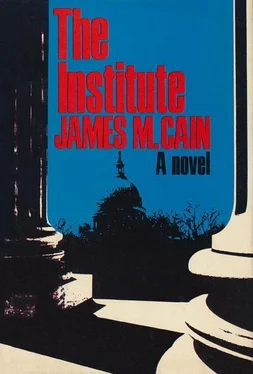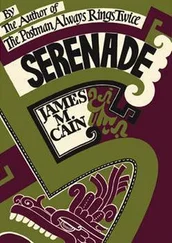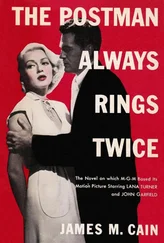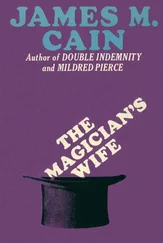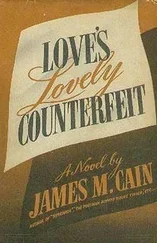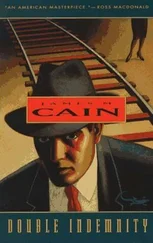“Wait a minute.”
It left me sick to my stomach to realize that I had killed someone. When I told the sergeant, he said: “Take your time. We’ve got all night.”
“No! Maybe you have, sergeant, but I don’t.” I snapped out of it then, telling him to make it quick, because I had to get to Cheverly to the hospital to find out how Hortense was.
“Calm down,” he said; “cool it. One thing at a time. You’re the only one who knows what happened, and I have to make a report. So — first things first. Names, please, addresses, and occupations, if you know them. First, this dead guy here—”
I gave him the Garretts’ names and the Wilmington apartment as their address, for him and for her, with the Watergate also for her. He said: “Wait a minute. You can’t live in two places at the same time.”
“You can if you’re rich enough.”
For the first time, he reacted to what he’d just written down. “Hey!” he exclaimed. “Those names were in the paper. They gave a party. The two of them gave it together, and the President came. Are these the same Garretts?”
“They gave a party, yes; and the President came.”
He looked at me and then at his notebook. “When did these people arrive tonight?” he said.
“I don’t know. I didn’t keep track.”
“Wait.”
He went to the phone and called the night watchman and questioned him. When he came back, he said: “Mr. Garrett got here at 11:52, but no women came, the night watchman says.”
“They must have used the rear entrance.”
“What rear entrance is that?”
I told him about the door from the parking lot, which was one floor down from the lobby, and about the freight elevator.
“Does that door stand open?” he said.
“No, I think they keep it locked.”
“And these women had a key?”
“Mrs. Garrett probably did, yes.”
“What for? So she could get in your place?”
“That’s right. She borrowed it sometimes, to use the phone or whatever, and I gave her a key.”
“O.K., get on with what happened, Mr. Palmer.”
“I thought I had already told you.”
“Well, I don’t — I don’t think so at all. Listen, if you clunked a woman and broke her neck to keep her from killing somebody, it’s all right with me and it’s all right with the law. I’d have no reason to hold you — provided you come clean. Now, you can have counsel if you want, and plead the Fifth, if you want — but only on the grounds that what you say might incriminate you. Would it?”
“Not that I know of.”
“Then you’ll have to talk. So get started.”
“Give me a minute to get it together.”
“Take your time.”
I began ticking it off, beginning with my first meeting with the Garretts. He sat looking at me, and then I realized that I was talking into a recorder which he had placed between us. I kept on and on, working down to Mr. Garrett’s arrival and what he had come about, his fear that Inga might push Hortense off a balcony. Then I brought the two women in, explaining that they had come without knowing Mr. Garrett would be there. Then I told him about the argument we’d had, trying to keep it brief but, at the same time, clear. I got to the shooting and my jumping at Inga, and finally that seemed to be it. He seemed satisfied.
“O.K., Mr. Palmer,” he said very respectfully, picking up the recorder. “I’ll ask you to come with me now while I get this down on paper. We’ll have to go to the police office in the County Building where I have a typewriter.”
“I have a typewriter here.”
“You do? Then, if I can borrow it...?”
“Be my guest. I’ll get it.”
I didn’t use it much, and it was in the spare bedroom. I got it for him and he set it up on the table, then started his recorder. So I wouldn’t hear my voice croaking at him, I wandered back to the bedroom I had shared with Hortense and lay on the bed in the dark. Then I heard someone come in and went out to find more police and orderlies there to take the bodies away. They made it quick, and then I was there with the sergeant who was still pecking away at the type-writer, accompanied by my voice. I went back to the bedroom. After awhile he called me. He seemed to be through and was studying what he had written.
“What do you do with it now?”
“Turn it in, of course.”
“Will newspaper reporters have access to it?”
“Well, that’s the whole idea. Under the law, they have the right. When copies are made of it, one will hang on a hook in the clerk’s room there in the County Building. Anyone can look, including even them.”
“You don’t seem to like them much.”
“Does anyone?”
He asked me to check it over “for facts,” so I had to read it. It was all there in police lingo, from my first call on the Garretts to the doctor’s pronouncement of death, with the “intimate relations” between Garrett and Inga precisely spelled out. But one thing I managed to hold back. If he suspected it, he didn’t show it, and that was the “intimate relations between Mrs. Garrett and me.” That wasn’t in the report, thank God, and when I had read it, I said to him: “Fine. It looks O.K. to me.”
He got up to go, telling me to stand by, “in case,” meaning don’t leave town till the case is wound up. Then he left. I sat for a minute and then went downstairs, got in the car, and drove to Cheverly where the Prince Georges General Hospital is.
The girl at the window spoke to me by name. “Do I know you,” I said to her.
“Not really, I suppose, Dr. Palmer. I was in your poetry class a couple of years ago, just for three days, till I switched my course. But I remember you well. What can we do for you?”
I said that I had come about “Mrs. Garrett, Mrs. Richard Garrett, to inquire how she is and see her if that’s permitted at this hour.”
“Well, I’m afraid it wouldn’t be—” running her finger over a memo of some kind. “Oh, here she is — yes, she’s in Intensive Care. Her condition, unfortunately, is critical.”
“Thank you. When can I see her?”
“At two this afternoon — for ten minutes, if, if the doctor will let you see her at all.”
I drove home and put in a twelve-o’clock wake-up with Western Union. Then I went to bed and when the call came, got up. In between, I guess, I slept, at least some kind of way. When I’d dressed, I went down to the lobby, picked up the paper, and read it, at least the high spots. It was all over page one and a couple of pages inside, with pictures of me, Hortense, and Mr. Garrett. But none of Inga, I suppose because they didn’t have any. When you’re a servant you don’t even have a picture of yourself in the files if you kill someone. And there was no mention of my relationship with Hortense beyond my being the director of the Institute, my resignation not having been announced yet. My being — or supposedly being — director of the Institute was the only explanation offered for the visitors I had at one in the morning. “Refusal on Mr. Garrett’s part to accept divorce and marry Miss Bergson” was the explanation for the shooting, according to the papers.
It took about twenty minutes to skim through. All during that time, Miss Nettie said nothing, although we were pretty good friends. But when I got up to go to the hospital, she said: “Quite a time you had last night.”
“You can say that again,” I grumbled.
“I want to hear all about it.”
“I’ll tell you, but not now, if you don’t mind. I’m not in the mood for talk.”
“Oh that I can well understand.”
At a quarter to two that afternoon, I was back at the hospital, talking to another nurse and getting the same report. “She’s in Intensive Care. Her condition is critical. You can visit for ten minutes if the physician in charge permits it.” So, following directions, I took an elevator, went down a long corridor, and found myself at a door with a dozen people in front of it. They were waiting while a nurse stood there with a card in her hand. When I stopped, she asked who I wanted to see, glanced at her card, and said: “You may stay ten minutes. Stand over there, please.” And she motioned for me to go back to the end of the line, and there I went. But a woman had looked up when I mentioned Hortense’s name, and now she came up to me.
Читать дальше
